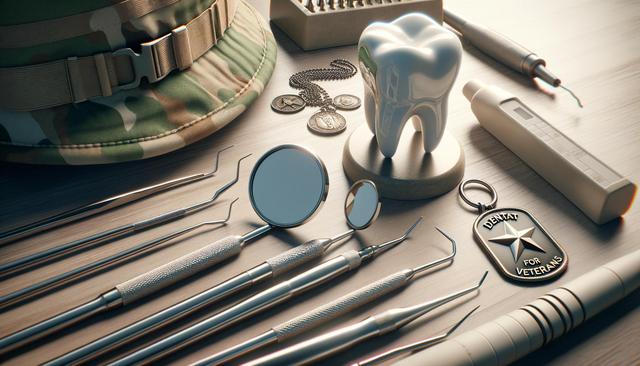A Guide to Dental Benefits for Veterans
Dental benefits for veterans cover a range of services, including exams, cleanings, and major dental work. Veterans may be eligible for free or low-cost dental care through the VA. Learn about the specific benefits available to veterans and how to apply for them.

Understanding VA Dental Benefits Eligibility
Eligibility for dental benefits through the U.S. Department of Veterans Affairs (VA) depends on several factors, including a veteran’s service history, disability status, and individual circumstances. Unlike general VA healthcare, dental care is not automatically available to all veterans. Specific categories determine who qualifies for free or subsidized dental services. For instance, veterans with a service-connected dental disability or condition rated as 100% disabling may be eligible for comprehensive dental care at no cost. Others may qualify based on participation in vocational rehabilitation programs or recent discharge within a specified time frame. Veterans enrolled in VA healthcare may also explore options under different dental benefit classes. These categories help the VA prioritize care and allocate resources efficiently.
Some common eligibility categories include:
- Veterans with a service-connected dental condition or disability
- Former prisoners of war
- Veterans enrolled in a VA vocational rehabilitation program
- Those receiving VA care for a medical condition aggravated by oral health issues
Understanding which category you fall into is the first step in accessing appropriate dental services through VA programs.
Available Dental Services Through the VA
For eligible veterans, the VA offers a wide range of dental services designed to maintain oral health and treat existing conditions. These services may vary depending on the level of eligibility and the specific VA facility. Common procedures covered include preventive care, restorative treatments, and surgical interventions. Preventive services often include routine exams, dental cleanings, and X-rays, which are essential for early detection of oral health issues. Restorative care may involve fillings, crowns, dentures, and treatments for gum disease. In more complex cases, veterans may receive oral surgery or treatment for jaw-related conditions.
Examples of dental services provided include:
- Routine check-ups and cleanings
- Tooth extractions
- Fillings and root canals
- Periodontal (gum) care
- Prosthetic services such as dentures and bridges
It’s important to check with your local VA dental clinic to understand the specific services available and whether prior authorization is needed for certain procedures.
Enrollment and Application Process
Veterans interested in VA dental care should begin by enrolling in the VA health care system, if they haven’t already. This can be done online through the VA website, by phone, by mail, or in person at a local VA facility. Once enrolled, veterans can check their eligibility for dental benefits through the VA’s dental benefits classifications. It’s helpful to have service records, VA disability ratings, and other documentation ready to support your application.
The application process generally involves:
- Enrolling in VA healthcare (if not yet enrolled)
- Completing VA Form 10-10EZ (Application for Health Benefits)
- Confirming your dental eligibility category through the VA
- Scheduling a dental exam or consultation at a VA dental clinic
Veterans who do not qualify for free VA dental care may still be eligible for the VA Dental Insurance Program (VADIP), which offers discounted premiums for comprehensive dental coverage through private providers partnered with the VA.
The VA Dental Insurance Program (VADIP)
For veterans who are not eligible for full dental coverage through the VA, the VA Dental Insurance Program (VADIP) provides an alternative option. VADIP allows eligible veterans and their family members to purchase private dental insurance at a reduced cost. This program offers flexibility in choosing a provider and coverage level, making it easier for veterans to access necessary dental care without high out-of-pocket expenses. Plans typically cover preventive services such as cleanings and exams, as well as major services like crowns and dentures, depending on the plan selected.
Key features of VADIP include:
- Available to veterans enrolled in VA healthcare and CHAMPVA beneficiaries
- Multiple plan options offered through participating private insurers
- Nationwide network of licensed dentists
- No waiting periods for preventive services
Enrollment in VADIP is voluntary and can be completed online through participating insurance carriers. It’s an important option for veterans who want to maintain their oral health but don’t meet the criteria for VA-provided dental care.
Additional Resources and Support
Veterans seeking dental care can find support through a variety of additional resources. Many VA facilities have social workers or benefits counselors who can assist with understanding eligibility, filing applications, and exploring both VA and non-VA dental options. Nonprofit organizations, state and local agencies, and community dental clinics may also offer free or reduced-cost dental services to veterans. In some cases, dental schools provide affordable services through supervised student programs, which can be a valuable alternative for those lacking coverage.
Other helpful resources include:
- VA’s official website for updated dental policies and forms
- Veterans Service Organizations (VSOs) that can provide advocacy and assistance
- State dental associations with veteran-specific programs
- Community clinics participating in veterans’ outreach efforts
Taking advantage of these resources can significantly improve access to dental care and help veterans maintain long-term oral health. Staying informed and proactive is key to navigating the system effectively.
Conclusion: Supporting Veterans’ Oral Health
Maintaining oral health is a vital part of overall well-being, and veterans deserve accessible, high-quality dental care. While eligibility requirements for VA dental benefits can be complex, understanding the available options and taking proactive steps to apply can open doors to a range of services. Whether qualifying through direct VA coverage or choosing a VADIP plan, veterans have multiple paths to protect their dental health. Utilizing additional community and nonprofit resources can also make a meaningful difference. Veterans are encouraged to explore every opportunity to receive the dental care they need and deserve.